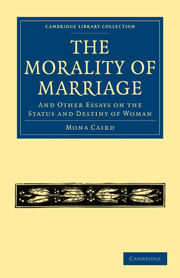PART II - THE PATRIA POTESTAS
Published online by Cambridge University Press: 16 May 2011
Summary
“The extension of the law of equal freedom to both sexes … being required by that first pre-requisite of greatest happiness, the law of equal freedom, such a concession is unquestionably right and good.”
Herbert Spencer.“Let us know how it is to be shown that the limits we have set to female activity are just the proper limits.”
—Herbert Spencer.At the time of the founding of Rome, the patriarchal system appears to have been fully established among the Latin races, with its accompanying sentiments regarding family life. That system became stereotyped in the ancient codes. Romulus is said to have been the author of the marriage laws and the laws of parental authority. They can, at any rate, boast a hoary antiquity. It is remarkable how the idea of perpetual tutelage is still firmly rooted among us, in a modified form, and how all the popular ideas of woman's sphere and virtues are to be found in that singular system of ancient Rome, which made the wife as a daughter in her husband's house, and her children as her brothers and sisters. The paterfamilias handed her over to the power of her husband, who then had the same rights of punishment—nay, of life and death, which the father had previously enjoyed. He might even sell her into slavery. The paternal power in its extreme form, after three centuries, was ratified in the Fourth Table of the Decemvirs.
- Type
- Chapter
- Information
- The Morality of MarriageAnd Other Essays on the Status and Destiny of Woman, pp. 41 - 50Publisher: Cambridge University PressPrint publication year: 2010First published in: 1897

